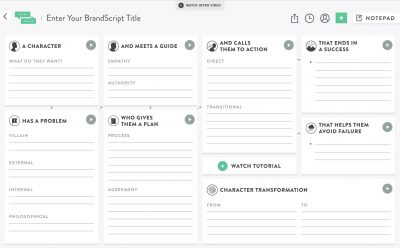How StoryBrand Helps You Clarify Your Marketing Message
JANUARY 15, 2019

Don Miller’s StoryBrand is a process in which you identify the journey your customer takes as they interact with your marketing messaging.
The goal of a BrandScript is to clarify your marketing message. The idea is that lack of clarity causes indecision. Basically, when people aren’t sure what to do, they’ll do nothing.
“The human brain, no matter what region of the world that comes from, is drawn toward clarity and away from confusion.” -Donald Miller, Building a StoryBrand
The structure of the customer’s journey in summary is this: The customer is the “hero,” you are the “guide,” the product is the “plan.” The call to action is a single step they need to take.

Online tool available at https://www.mystorybrand.com/
We apply the above approach to all copy in different forms (sales pages, emails, blog posts, etc.)
Why Story? Story formulas put everything in order to understand what’s going on. Story is a sense-making device. –Donald Miller
The BrandScript articulates that journey in a way that connects the dots with the potential customer.Every human being is on a transformational journey. Feelings of self-doubt are universal, as is the desire to become someone who is independent and courageous.
How to make StoryBrand work for you:
1. Identify who your character is and what he/she wants. A story starts with a hero who wants something, Miller says in his book, Building a StoryBrand.
2. Identify their problems. The more we talk about the problems our customers experience, the more interest they will have in our brand, Miller says. There are three types of universal problems: external (tangible or physical), internal (self-doubt), philosophical (what’s at stake when it comes to the bigger picture?).
|
3. Position your brand as the “guide.” As soon as we define the customer’s problems and they identify with them, the customer will immediately begin to ask: Can this brand help me get what I want? The two things that brand must communicate to position themselves as the guide are empathy and authority.
|
4. Articulate a clear plan for the customer. Clarify how they can do business with you, or allay any fears they might have with purchasing or engaging with you. Write out the steps as simply as possible and give your plan a name.
5. Call your potential customer to action. There are two types of Calls to Action: direct (“buy now,” “schedule an appointment,” or “call today”) and transitional (watch a webinar, download a PDF).
6. Cast a vision for what success (or failure) looks like. Your customer has to know what is at stake. Without showing people the cost of not business with us, there is no motivation to take action. What will customer’s life will look like if their problem is solved, how will they feel, and how will the world a more better place? Then what does the reserve look like?
Your content should offer an aspirational identity and invite your customer to identify with and step into it. Everyone wants to be taken some place better — to something better and bigger than themselves.
And they need someone to tell them they’re different, they’re better. That somebody is the guide – YOU.
Want to see StoryBrand in action? Download this free case study to go behind-the-scenes of a $2.3M StoryBrand-powered launch we did for one of our clients.
